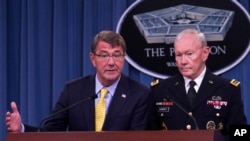In language rarely heard since the end of the Cold War, Defense Secretary Ash Carter said that Russia again poses an “existential threat” to the United States and in many ways behaves like an antagonist.
“Russia poses an existential threat to the United States by virtue simply of the size of the nuclear arsenal that it's had,” Carter said at a Pentagon briefing Thursday, responding to a question about whether he agreed with recent assessments by top military officials that Moscow today constitutes a larger threat to the U.S. than the Islamic State group.
Carter acknowledged that for a quarter century the U.S. has not regarded Russia as an adversary, but that with President Vladimir Putin at its helm this has now changed. The U.S. needs to adjust to this new reality, he added.
“Vladimir Putin's Russia behaves, in many respects, as - in some respects and in very important respects, as an antagonist. That is new. That is something, therefore, that we need to adjust to and counter,” Carter said.
Stressing that the U.S. is taking a “strong and balanced” approach to these new challenges, the Pentagon chief said that “we are adjusting our capabilities qualitative and in terms of their deployments, to take account of this behavior of Russia,” Carter said referring to Russia’s posturing with regard to some its neighbors.
Carter said that to this end the U.S. is working with NATO in efforts “oriented towards deterrence on its eastern border and with hardening countries… on the borders of Russia, NATO members and non-NATO members, to the kind of hybrid warfare influence or little green men kind of influence that we see associated with Russia in Ukraine.”
The reference was to armed military personnel without insignia that could be observed in Ukraine’s Crimea prior to its annexation by Russia in March of last year.
Regular Russian forces fighting incognito are also suspected to be actors in the ongoing conflict in eastern Ukraine, a charge Moscow denies.
At the same time, Carter said, the U.S. will continue to work with Moscow in areas “where Russia sees its interests aligned with ours,” citing counterterrorism, Iran and North Korea as examples.
He held out little hope that the relationship will improve anytime soon, but said that the U.S. will keep the door open.
“We'll continue to hold open the door so that if either under Vladimir Putin or some successor of his in the future, there's a leadership that wants to take Russia in the direction that, I believe, is best for Russia, which is not one of confrontation with the rest of the world and self- isolation, which is the path they're on now, but better economic and political integration with the rest of the world…,” Carter said.





